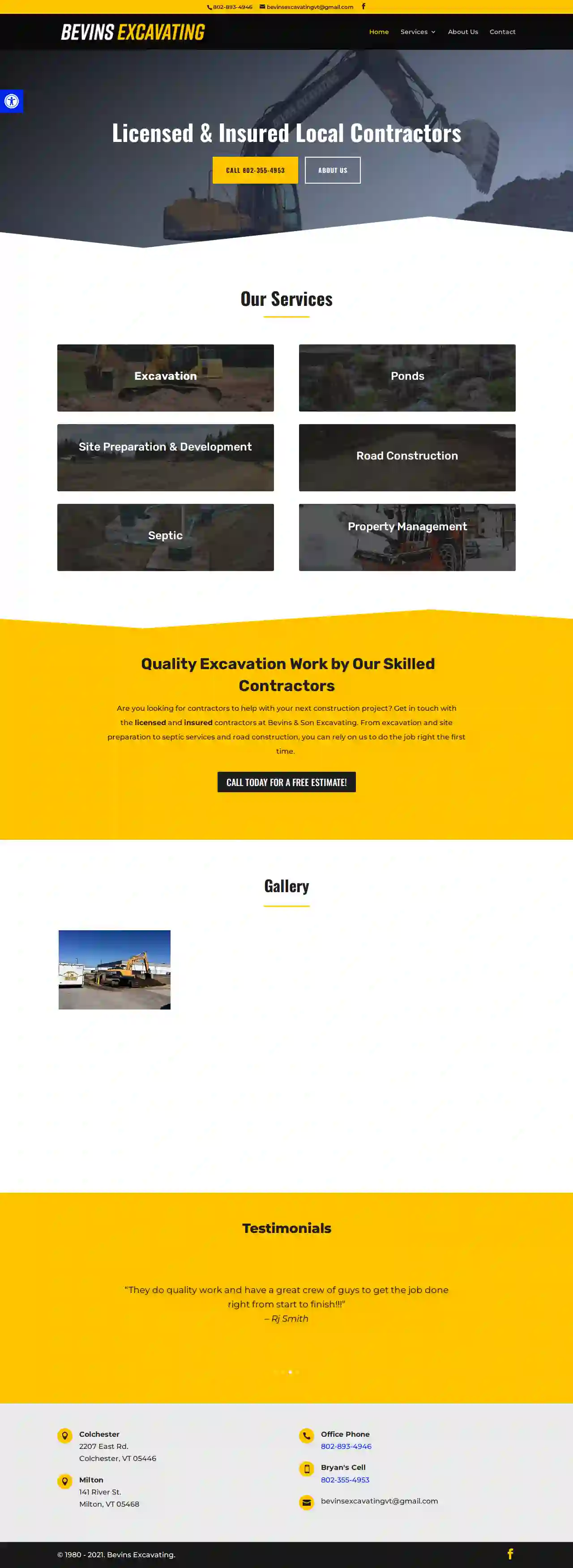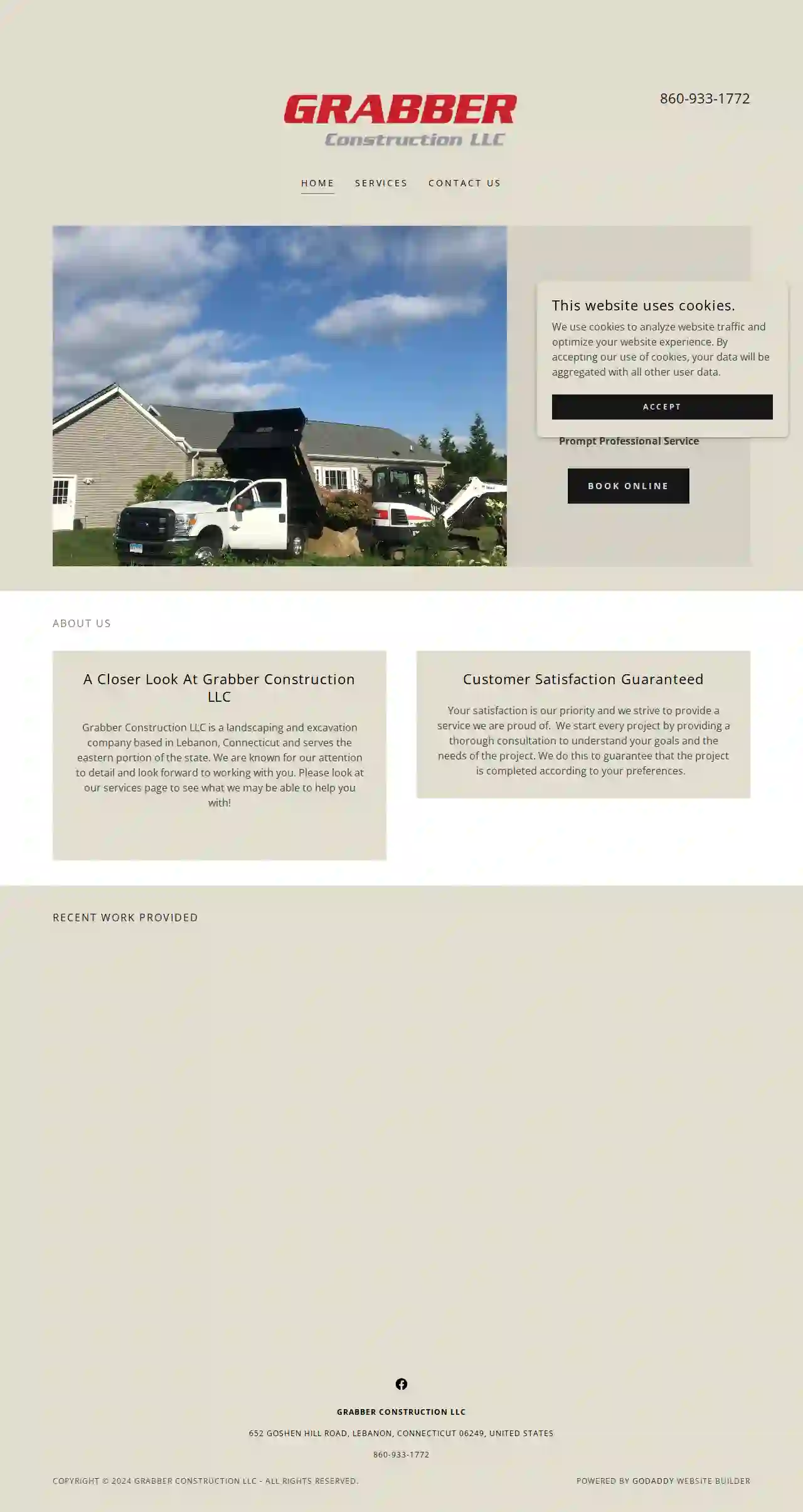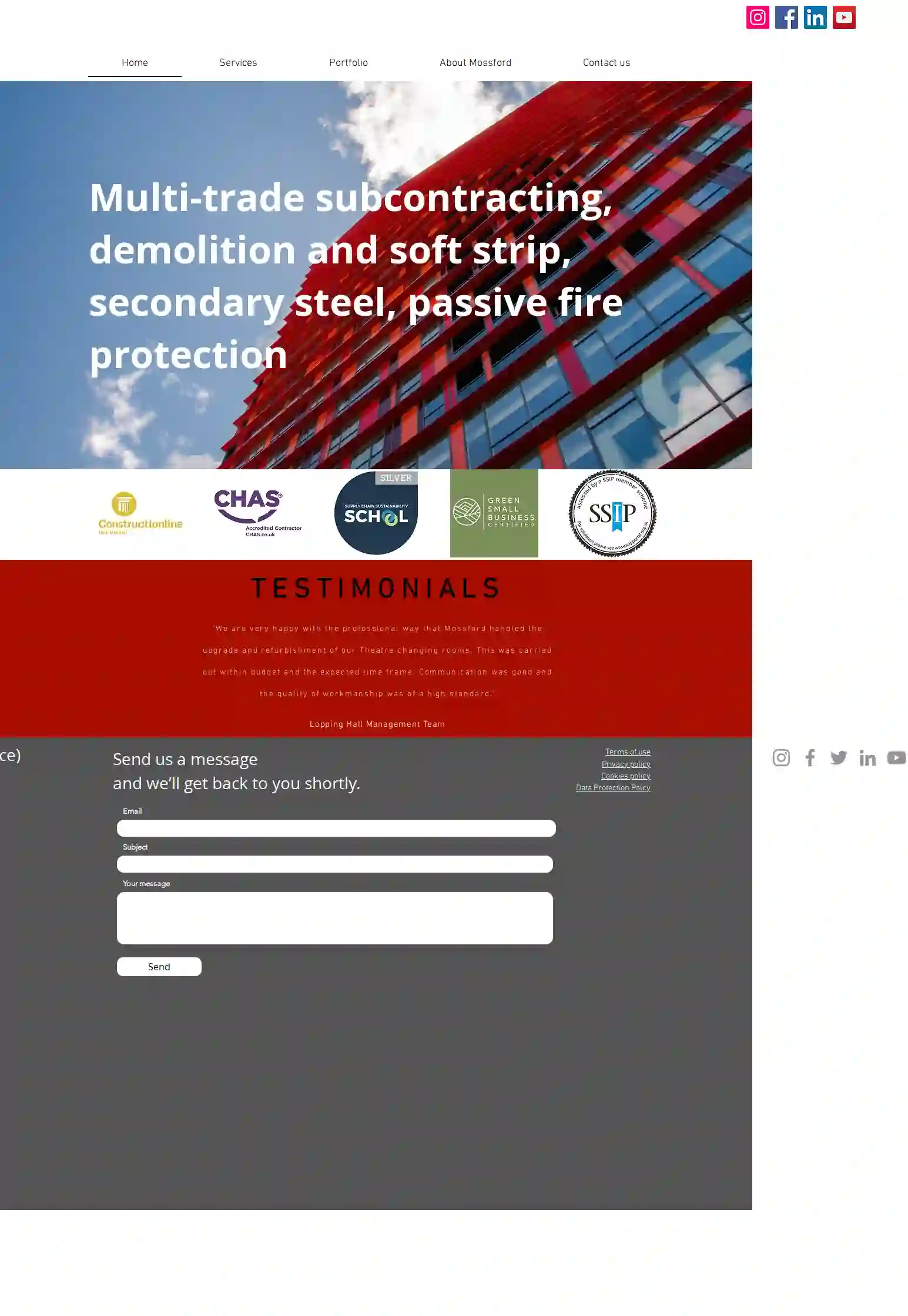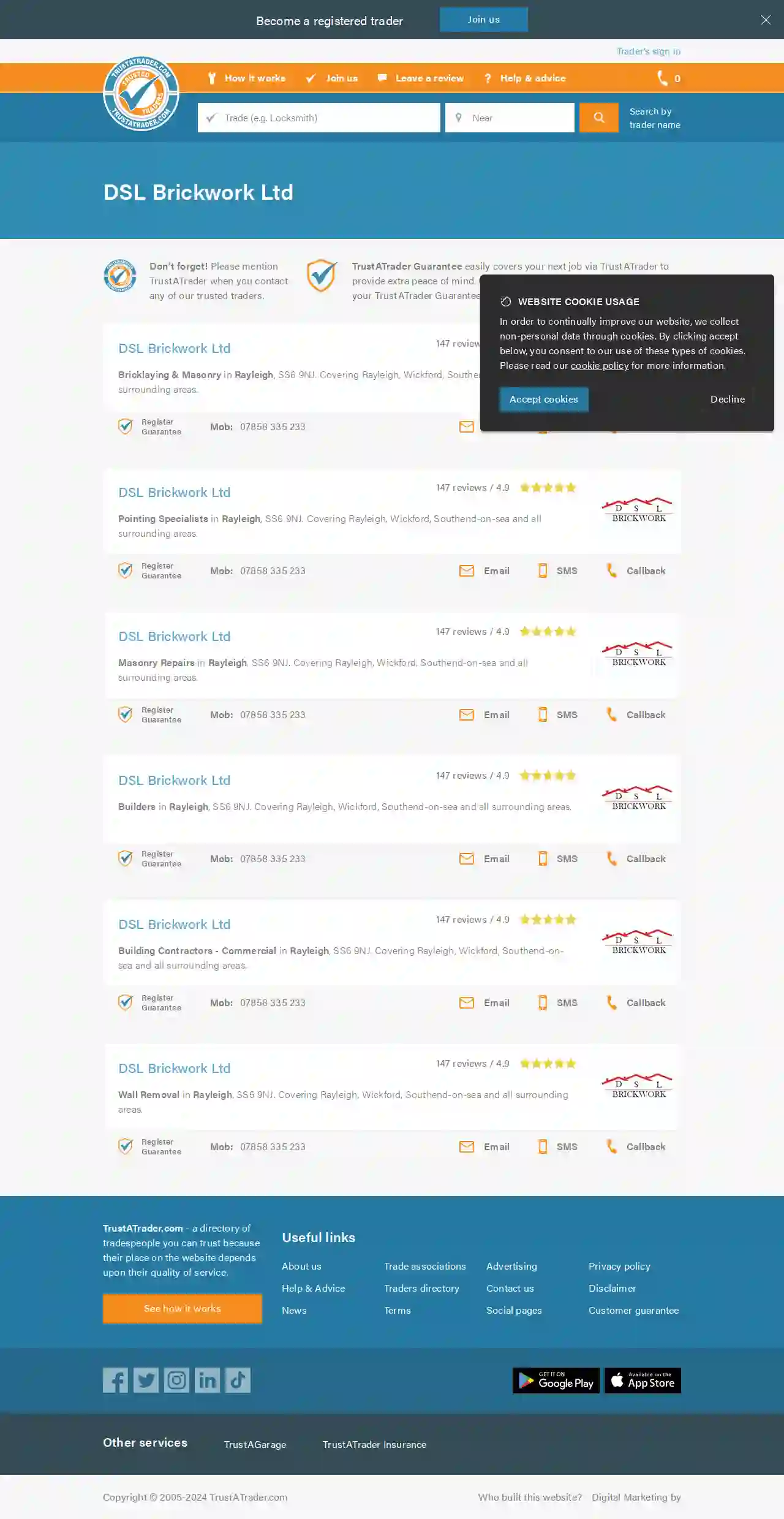Demolition Contractors Laindon
Find Demolition Contractor in Laindon
Receive multiple Demolition Services quotes for your project today! Compare profiles, reviews, accreditations, portfolio, etc... and choose the best service.

Sterling Groundworks Essex and London
52 reviewsHowes Farm, Doddinghurst Road, Brentwood, CM15 0SG, GBAbout Us Sterling Groundworks have been operating since 2016 and are a family run business based in Essex. We primarily operate in the South-East of England, but have experience working nationwide and around Europe. We have a dedicated team for commercial groundworks for large scale infrastructure projects. How We Work We will help you achieve a problem & stress-free project from start to finish. Survey and Analyse. Highly regarded for groundwork in Essex, we have vast experience in all aspects of groundwork. Not just a landscaping and surfacing company, Sterling Groundworks LTD provides all types of groundwork for commercial and residential clients in London, Essex, Brentwood and surrounding areas. From customers who own their own properties and require assistance with vegetation clearance, tree crown reduction, all the way through to a completely landscaped finished project. To large organisations, our groundworks London team, have the skills and permissions to assist with land waste management, drainage cleaning services through digging footings and preparing your ground for any and all projects. Quotation, Planning and how jobs gonna be done. Our professional and abundantly skilled team here at Sterling Groundworks LTD, will invest their time to understand your project fully. Ensuring that you are left 100% satisfied and your unique groundwork project meets your individual and specific requirements. Whether it is a smaller project, fencing, paving, a new drive all the way through to roads and larger excavations, we will ensure that that your project is delivered to the highest standard whilst remaining competitively priced. Job starts, execution, etc. We work specifically with contractors to deliver groundworks on time and to specification. We have a dedicated support team on hand to deal with a project life cycle. Our reputation within the industry is excellent due to our dedication, attention to detail and strict health and safety policies that are in place. We look after all of our staff to ensure we keep our employees that are absolutely key in us staying at the forefront of our industry. We are your groundworks professionals Get in contact today and one of our friendly staff will be able to answer your questions.
- Services
- Why Us?
- Gallery
Get Quote
Bevins & Son Excavating
12207 East Rd., Colchester, 05446, GBQuality Excavation Work by Our Skilled Contractors Are you looking for contractors to help with your next construction project? Get in touch with the licensed and insured contractors at Bevins & Son Excavating. From excavation and site preparation to septic services and road construction, you can rely on us to do the job right the first time. CALL TODAY FOR A FREE ESTIMATE!
- Services
- Why Us?
- Testimonials
- Gallery
Get Quote
Grabber Construction LLC
4.924 reviews652 Goshen Hill Road, Lebanon, 06249, GBAbout Us Grabber Construction LLC is a landscaping and excavation company based in Lebanon, Connecticut and serves the eastern portion of the state. We are known for our attention to detail and look forward to working with you. Please look at our services page to see what we may be able to help you with! Customer Satisfaction Guaranteed Your satisfaction is our priority and we strive to provide a service we are proud of. We start every project by providing a thorough consultation to understand your goals and the needs of the project. We do this to guarantee that the project is completed according to your preferences.
- Services
- Why Us?
- Gallery
Get Quote
Mossford Construction Co Ltd
41 reviews110 High Road Loughton, Loughton, IG10 4HJ, GBMossford Construction Co Ltd Mossford is a multi-trade subcontracting company specializing in demolition and soft strip, secondary steel, and passive fire protection. We are committed to providing high-quality workmanship and excellent customer service. Our team of experienced professionals is dedicated to delivering projects on time and within budget. We are proud of our reputation for reliability and professionalism. We are committed to providing a safe and healthy working environment for our employees and subcontractors. We are also committed to minimizing our environmental impact. We are a member of the Construction Industry Scheme (CIS) and are fully insured. We are committed to providing our clients with the highest level of service and satisfaction. We are always looking for ways to improve our services and meet the needs of our clients. We are confident that we can provide you with the best possible service. We are very happy with the professional way that Mossford handled the upgrade and refurbishment of our Theatre changing rooms. This was carried out within budget and the expected time frame. Communication was good and the quality of workmanship was of a high standard. - Lopping Hall Management Team
- Services
- Why Us?
- Testimonials
- Gallery
Get Quote
TLC Building Services
12 reviewsSuite 28 Colchester Business centre, Colchester, Essex, CO1 2JS, GBTLC Home Group is a family-run business with extensive experience in delivering high-quality Renewables and construction projects, from single new build homes and extensions to multi-million pound conversions of commercial buildings. We are committed to harnessing the power of renewable energy to create a greener, more sustainable future. Our business started up in Colchester and has expanded to serve areas across Essex, Suffolk and London. Explore our diverse portfolio and services that makes our trusted family-run business proud to say we're large enough to trust, but small enough to care. We are committed to providing the highest standard at affordable prices. We love sharing ideas at TLC Home Group and are keen to hear your vision for your property. Get in touch by filling out the form, contacting the details on this page or making an appointment to see us in our Ipswich offices. TLC is also able to arrange a viewing of one of our many ongoing projects. Please get in touch with your details and we will find what build best addresses your situation.
- Services
- Why Us?
- Gallery
Get Quote
DSL Brickwork
1.56 reviewsRayleigh, SS6 9NJ, GBDSL Brickwork Ltd DSL Brickwork Ltd is a trusted and reliable bricklaying and masonry company based in Rayleigh, Essex. They offer a wide range of services, including bricklaying, pointing, masonry repairs, building, and building contracting. They are known for their high-quality workmanship and commitment to customer satisfaction. DSL Brickwork Ltd has been serving the Rayleigh area for many years and has built a strong reputation for their professionalism and expertise. They are fully insured and accredited, giving you peace of mind that your project is in safe hands. Services Offered Bricklaying & Masonry Pointing Specialists Masonry Repairs Builders Building Contractors - Commercial Wall Removal Areas Covered DSL Brickwork Ltd covers Rayleigh, Wickford, Southend-on-sea and all surrounding areas. Contact Information Mob: 07858 335 233
- Services
- Why Us?
- Gallery
Get Quote
DJB Build
510 reviews123 Main Street, Birmingham, B12 9AB, GBAbout DJB Build DJB Build is a family-run building company based in the heart of the UK. We have over 20 years of experience in the construction industry, providing a wide range of building services to both domestic and commercial clients. Our team of skilled and experienced builders are dedicated to delivering high-quality workmanship and exceptional customer service. We pride ourselves on our attention to detail, commitment to deadlines, and competitive pricing. Whether you're looking for a small renovation or a large-scale construction project, DJB Build is the company you can trust to get the job done right. We are committed to providing our clients with a stress-free and enjoyable building experience. We work closely with our clients throughout the entire project, ensuring that their needs and expectations are met. We are also fully insured and accredited, giving you peace of mind that your project is in safe hands.
- Services
- Why Us?
- Accreditations
- Our Team
- Testimonials
- Gallery
Get Quote
Wickford Drainage - Blocked Drains
51 reviewsWickford, GBBlocked Drains Essex: Your Wickford Drainage Experts When your drains are causing trouble, Blocked Drains Essex is here to provide immediate assistance. We offer a comprehensive range of repair and maintenance services to address any drainage issue, big or small. Drainage problems can be incredibly inconvenient and unpleasant. Overflowing sinks, backed-up toilets, foul odors, and the risk of sewage flooding your home are all signs of blocked drains. Blockages or leaks in hard-to-reach areas of your drainage system are often impossible to tackle on your own. That's where we come in. As Wickford's largest and most respected privately-owned drainage and wastewater contractor, we provide a full spectrum of domestic drainage services. From clearing blockages and repairing broken pipes to performing essential maintenance to keep your plumbing in top working condition, we handle it all. You can rest assured that whatever your drainage needs, you'll always have qualified, well-trained engineers at your disposal, utilizing the latest technology to complete the job efficiently.
- Services
- Why Us?
- Gallery
Get Quote
Pribble Excavating
51 reviews18 Ross Road, Essex, 12936, GBExperience Pribble Excavating is an established business with experienced equipment operators and a variety of equipment and tools to get the job done efficiently. Our services include site work construction, clearing (forestry mulching), foundations/retaining walls, ponds, drainage, water, power/utilities, sewer/septic, roads/driveways, building and debris removal, hauling, topsoil/gravel, and foundation core drilling. Prompt and Reliable We work closely with other contractors to make sure your project is streamlined and done efficiently. We work in all seasons and all weather to get your project done. Who We Are With many years of experience, Pribble Excavating has a growing list of highly satisfied customers. We are always prepared to discuss options with our customers to provide them with the most effective way to take care of their needs.
- Services
- Why Us?
- Gallery
Get Quote
Ace Demolition Services Limited
51 reviewsHigh Ongar, Ongar, The Street, CM5 9NB, GBExperienced & Reliable Demolition Services, for over 25 years. Building Visions, Shaping The Future GET A QUOTE READ MORE We pride ourselves on having years of experience, working with both small firms and large corporations. We carry out demolition services in all areas of London and Essex. ABOUT OUR COMPANY We understand the importance of choosing the right demolition company.
- Services
- Why Us?
- Testimonials
- Gallery
Get Quote
Over 11,537+ Excavation Contractors onboarded
Our excavation pros operate in Laindon & surroundings!
ExcavationHQ has curated and vetted Top Excavation Companies near Laindon. Find a trustworthy contractor today.
Frequently Asked Questions About Demolition Contractors
- Dust Suppression: Use water spraying, misting systems, or other dust suppression techniques to control airborne particles.
- Noise Barriers: Erect temporary noise barriers around the demolition site to reduce noise transmission to nearby properties.
- Work Schedule: Schedule noisy demolition activities during permitted hours to minimize disturbance to neighbors.
- Communication: Keep neighbors informed about the demolition schedule and any potential disruptions.
- Implosion: Using explosives to collapse a structure inwards rapidly. Suitable for large buildings in open areas.
- Wrecking Ball: Swinging a large steel ball to impact and break down the structure. Effective for bringing down walls and other solid elements.
- High-Reach Demolition: Utilizing specialized excavators with extended arms and demolition attachments for dismantling tall structures piece by piece.
- Selective Demolition: Removing specific parts of a building while preserving other sections. Often used in renovation projects.
- Deconstruction: Carefully dismantling a building to salvage reusable materials, reducing waste and environmental impact.
- Feasibility Studies: Assessing the viability and challenges of a demolition project.
- Demolition Planning: Developing demolition plans, including method selection, sequencing, and safety procedures.
- Permitting Assistance: Navigating the demolition permitting process and ensuring compliance with regulations.
- Hazardous Material Surveys: Identifying and managing hazardous materials, such as asbestos and lead paint.
- Cost Estimating: Providing accurate cost estimates for demolition services.
- Project Management: Overseeing the demolition process and ensuring it proceeds as planned.
- 'Can I see proof of your licensing and insurance?' Verify their credentials and coverage.
- 'What experience do you have with projects like mine?' Ensure they have relevant expertise.
- 'Can you provide references from past clients?' Check their reputation and customer satisfaction.
- 'What are your safety protocols?' Prioritize contractors who emphasize safety.
- 'How will you handle hazardous materials?' Ensure they have proper procedures for asbestos or lead abatement.
- 'What is your timeline for completing the project?' Understand the project duration.
- 'How will you manage noise, dust, and debris?' Discuss mitigation measures for minimizing disruption.
- 'What are your payment terms?' Clarify payment schedules and any required deposits.
How can I minimize the dust and noise from demolition?
What are the different types of demolition?
What is the role of a demolition consultant?
What questions should I ask a demolition contractor before hiring them?
How can I minimize the dust and noise from demolition?
- Dust Suppression: Use water spraying, misting systems, or other dust suppression techniques to control airborne particles.
- Noise Barriers: Erect temporary noise barriers around the demolition site to reduce noise transmission to nearby properties.
- Work Schedule: Schedule noisy demolition activities during permitted hours to minimize disturbance to neighbors.
- Communication: Keep neighbors informed about the demolition schedule and any potential disruptions.
What are the different types of demolition?
- Implosion: Using explosives to collapse a structure inwards rapidly. Suitable for large buildings in open areas.
- Wrecking Ball: Swinging a large steel ball to impact and break down the structure. Effective for bringing down walls and other solid elements.
- High-Reach Demolition: Utilizing specialized excavators with extended arms and demolition attachments for dismantling tall structures piece by piece.
- Selective Demolition: Removing specific parts of a building while preserving other sections. Often used in renovation projects.
- Deconstruction: Carefully dismantling a building to salvage reusable materials, reducing waste and environmental impact.
What is the role of a demolition consultant?
- Feasibility Studies: Assessing the viability and challenges of a demolition project.
- Demolition Planning: Developing demolition plans, including method selection, sequencing, and safety procedures.
- Permitting Assistance: Navigating the demolition permitting process and ensuring compliance with regulations.
- Hazardous Material Surveys: Identifying and managing hazardous materials, such as asbestos and lead paint.
- Cost Estimating: Providing accurate cost estimates for demolition services.
- Project Management: Overseeing the demolition process and ensuring it proceeds as planned.
What questions should I ask a demolition contractor before hiring them?
- 'Can I see proof of your licensing and insurance?' Verify their credentials and coverage.
- 'What experience do you have with projects like mine?' Ensure they have relevant expertise.
- 'Can you provide references from past clients?' Check their reputation and customer satisfaction.
- 'What are your safety protocols?' Prioritize contractors who emphasize safety.
- 'How will you handle hazardous materials?' Ensure they have proper procedures for asbestos or lead abatement.
- 'What is your timeline for completing the project?' Understand the project duration.
- 'How will you manage noise, dust, and debris?' Discuss mitigation measures for minimizing disruption.
- 'What are your payment terms?' Clarify payment schedules and any required deposits.